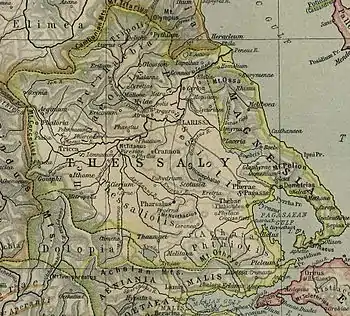Malloea
Malloea or Maloea or Mallaea or Malloia (Ancient Greek: Μαλλοία) was a town and polis (city-state)[1] of southern Perrhaebia in ancient Thessaly. It is quoted by Livy that the town surrendered to the army of Aetolian League in 200 BCE.[2] Again, during the Roman-Seleucid War, it was seized by an army of Aetolians under Menippus in 191 BCE.[3] and shortly afterward it was attacked by the army of Philip V of Macedon. Upon the arrival of Roman troops, who were then allies of Philip, Malloea surrendered.[4] In 185 BCE, the Perrhaebians requested the return of Malloea, Ericinium and Gonnocondylum, which Philip had re-named Olympias.[5] In 171 BCE, during the Third Macedonian War, the town was taken and looted by the Romans.[6]

The site of Malloea is at the paleokastro (old fort) near Margara, a site in the community of Sykia.[7][8]
References
- Mogens Herman Hansen & Thomas Heine Nielsen (2004). "Thessaly and Adjacent Regions". An inventory of archaic and classical poleis. New York: Oxford University Press. p. 724. ISBN 0-19-814099-1.
- Livy. Ab Urbe Condita Libri (History of Rome). 31.41.
- Livy. Ab Urbe Condita Libri (History of Rome). 36.10.
- Livy. Ab Urbe Condita Libri (History of Rome). 36.13.
- Livy. Ab Urbe Condita Libri (History of Rome). 39.25.
- Livy. Ab Urbe Condita Libri (History of Rome). 42.67.
- Richard Talbert, ed. (2000). Barrington Atlas of the Greek and Roman World. Princeton University Press. p. 55, and directory notes accompanying.
- Lund University. Digital Atlas of the Roman Empire.
![]() This article incorporates text from a publication now in the public domain: Smith, William, ed. (1854–1857). "Mallaea". Dictionary of Greek and Roman Geography. London: John Murray.
This article incorporates text from a publication now in the public domain: Smith, William, ed. (1854–1857). "Mallaea". Dictionary of Greek and Roman Geography. London: John Murray.
